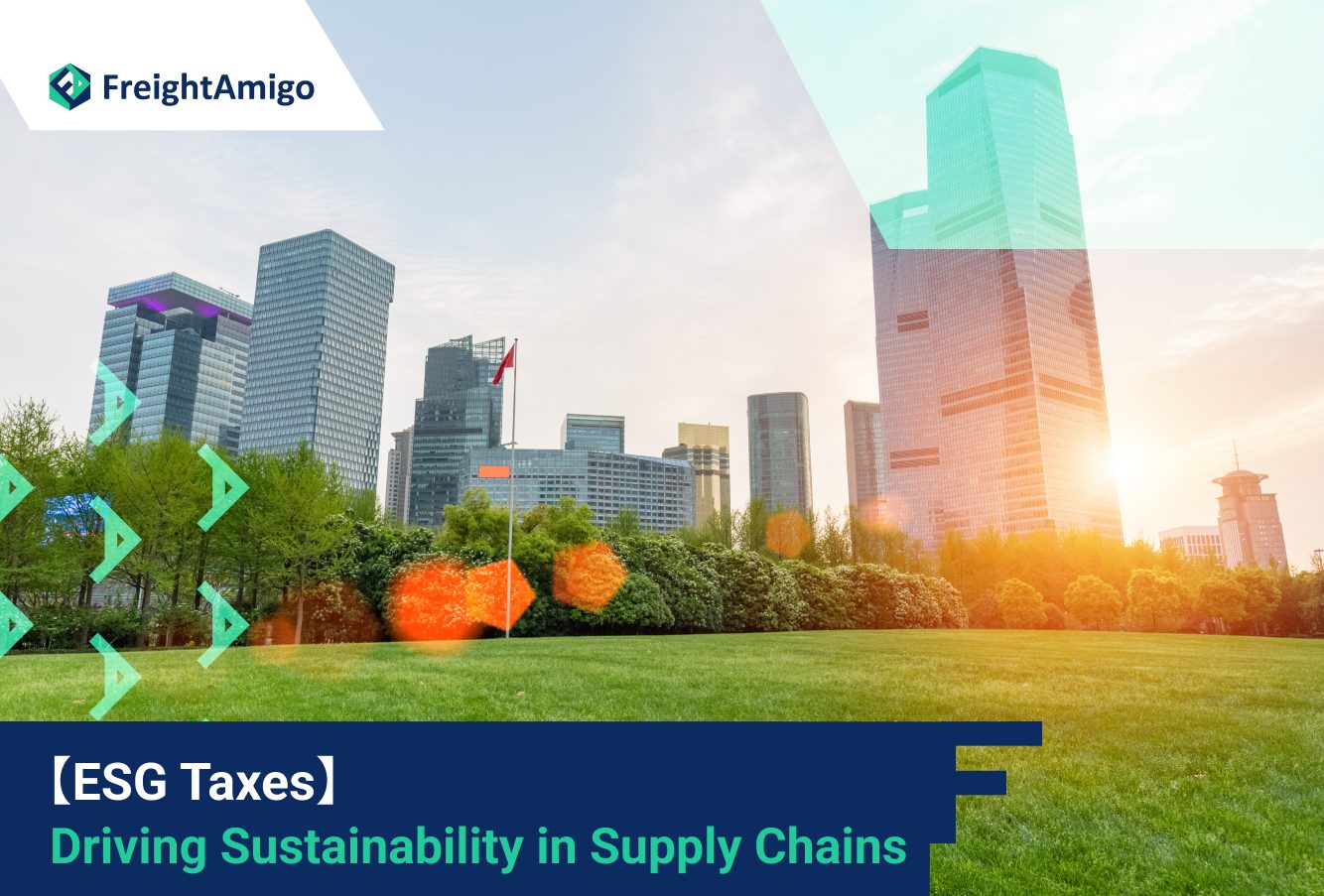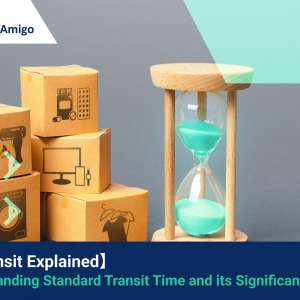Author Name: Tiffany Lee – Marketing Analyst at FreightAmigo
In today’s rapidly changing world, sustainability has become a pressing concern for businesses and governments alike. As companies strive to reduce their environmental footprint and promote social responsibility, the concept of Environmental, Social, and Governance (ESG) taxes has emerged as a powerful tool to drive sustainability in supply chains.
So, what exactly are ESG taxes and how do they work? ESG taxes are financial levies imposed on companies based on their environmental, social, and governance performance. These taxes are designed to encourage businesses to adopt sustainable practices, reduce their carbon emissions, promote fair labor practices, and ensure transparency in their governance structures.
Want To Compare The Best Express, Air Freight, Sea Freight, Rail Freight & Trucking Rates So As To Have Better Control On Cost?
The Importance of Driving Sustainability in Supply Chains
Sustainability in supply chains is crucial for several reasons. First and foremost, it helps to mitigate the adverse impact of business activities on the environment. By implementing sustainable practices, companies can reduce their carbon emissions, conserve natural resources, and minimize waste generation. This not only benefits the planet but also helps businesses build a positive brand image and attract environmentally conscious customers.
Moreover, driving sustainability in supply chains promotes social responsibility. It ensures fair labor practices, safe working conditions, and respect for human rights throughout the supply chain. When companies prioritize the well-being of their employees and communities, it leads to increased job satisfaction, employee retention, and overall societal well-being.
Finally, sustainability in supply chains is essential for long-term business resilience. By investing in sustainable practices, companies can future-proof their operations against regulatory changes, market trends, and resource scarcity. This proactive approach enables businesses to adapt and thrive in an ever-evolving global landscape.
Benefits of Implementing ESG Taxes in Supply Chains
The implementation of ESG taxes in supply chains offers numerous benefits. Firstly, it serves as a financial incentive for companies to adopt sustainable practices. By imposing additional costs on unsustainable activities, ESG taxes encourage businesses to invest in renewable energy, reduce waste, and implement eco-friendly technologies. This not only benefits the environment but also drives innovation and fosters the development of sustainable solutions.
Secondly, ESG taxes promote transparency and accountability. By levying taxes based on ESG performance, companies are compelled to disclose relevant information regarding their environmental impact, social practices, and governance structures. This increased transparency allows stakeholders to make informed decisions, hold businesses accountable, and push for positive change.
Furthermore, implementing ESG taxes can create a level playing field in the business landscape. By ensuring that all companies bear the costs of their environmental and social impact, ESG taxes prevent unfair competition and discourage unsustainable practices. This encourages businesses to prioritize sustainability and rewards those that have already made strides in this area.
Challenges and Obstacles in Implementing ESG Taxes
While ESG taxes offer significant benefits, their implementation is not without challenges. One of the main obstacles is the lack of standardized metrics and reporting frameworks. Without consistent and comparable data, it becomes difficult to measure and assess the ESG performance of companies accurately. To overcome this challenge, there is a need for internationally recognized standards and guidelines that can streamline ESG reporting and facilitate meaningful comparisons.
Another challenge lies in the resistance from certain industries and stakeholders. Some businesses may view ESG taxes as an additional financial burden that could hinder their competitiveness. To address this concern, it is essential to develop clear communication strategies that highlight the long-term benefits of sustainability and ESG taxes. Demonstrating the positive impact on brand reputation, customer loyalty, and financial performance can help to gain buy-in from reluctant stakeholders.
How ESG Taxes Can Incentivize Sustainable Practices
ESG taxes play a crucial role in incentivizing sustainable practices by aligning financial interests with environmental and social goals. The additional costs imposed on unsustainable activities create a financial incentive for businesses to invest in sustainable alternatives. This can drive innovation and accelerate the development and adoption of eco-friendly technologies and practices.
Moreover, the revenue generated from ESG taxes can be reinvested into sustainability initiatives. Governments can allocate these funds towards research and development of green technologies, infrastructure improvements, and education programs. This creates a positive feedback loop, where the taxes collected are used to further drive sustainability and support businesses in their transition towards more sustainable practices.
The Role of Government and Policy in Promoting ESG Taxes
The successful implementation of ESG taxes relies heavily on government support and robust policy frameworks. Governments play a crucial role in setting clear regulations, standards, and targets for sustainability. They can provide financial incentives, such as tax breaks or subsidies, to encourage businesses to adopt sustainable practices. Additionally, governments can collaborate with international bodies and stakeholders to establish globally recognized ESG reporting standards.
Effective policy implementation also requires strong enforcement mechanisms. Governments need to ensure rigorous monitoring and reporting mechanisms to verify ESG performance and compliance. This will help to maintain the integrity of ESG taxes and prevent greenwashing, where companies falsely claim to be sustainable without concrete actions to support their claims.
Conclusion: The Potential Impact of ESG Taxes on Sustainability in Supply Chains
ESG taxes have the potential to drive sustainability in supply chains and create a positive impact on the environment, society, and businesses. By aligning financial incentives with environmental and social goals, ESG taxes encourage companies to adopt sustainable practices, reduce their carbon emissions, promote fair labor practices, and ensure transparency in their governance structures.
The implementation of ESG taxes offers numerous benefits, including financial incentives, transparency, and a level playing field. However, challenges such as standardized metrics and resistance from certain industries need to be addressed to ensure the successful implementation of ESG taxes.
With the support of governments and robust policy frameworks, ESG taxes can become a powerful tool to accelerate the transition towards a more sustainable future. By driving sustainability in supply chains, ESG taxes can create a positive impact on the planet, society, and the long-term resilience of businesses.
There Are Different Options For Cargo Transportation. If You Want To Choose The Most Convenient And Suitable Solution, It Is Best To Have The Full Support Of Logistics Experts! If You Are Planning To Ship Goods Overseas, Please Go To The FreightAmigo Page For Inquiries.
===
Read More:
【Cosmetic Product Recycling】 A Guide to Sustainable Reverse Logistics
【Rise of Green Supply Chain】 Pioneering Sustainable Practices in Logistics
【ESG in Logistics】 How ESG Practices Drive Social Responsibility in Logistics
===
If you have any inquiries on logistics/supply chain, feel free to contact FreightAmigo now:
Chat with us online OR
Phone : +852 28121686
WhatsApp: +852 27467829









































